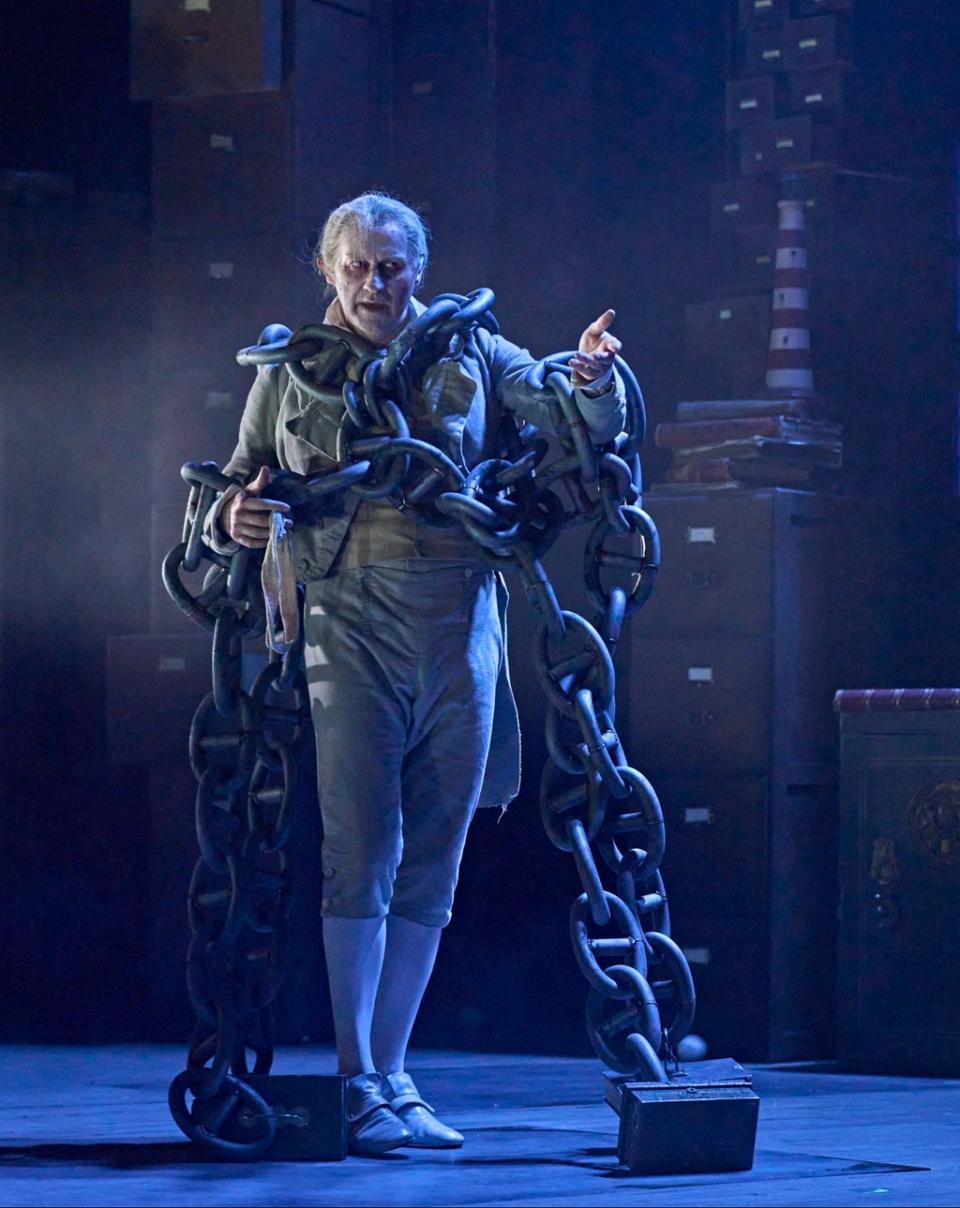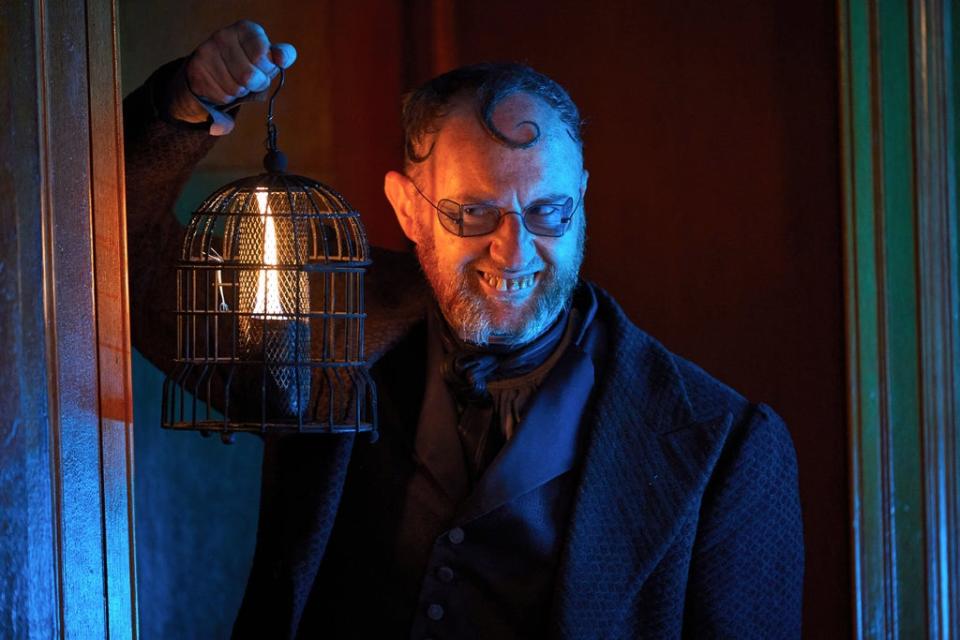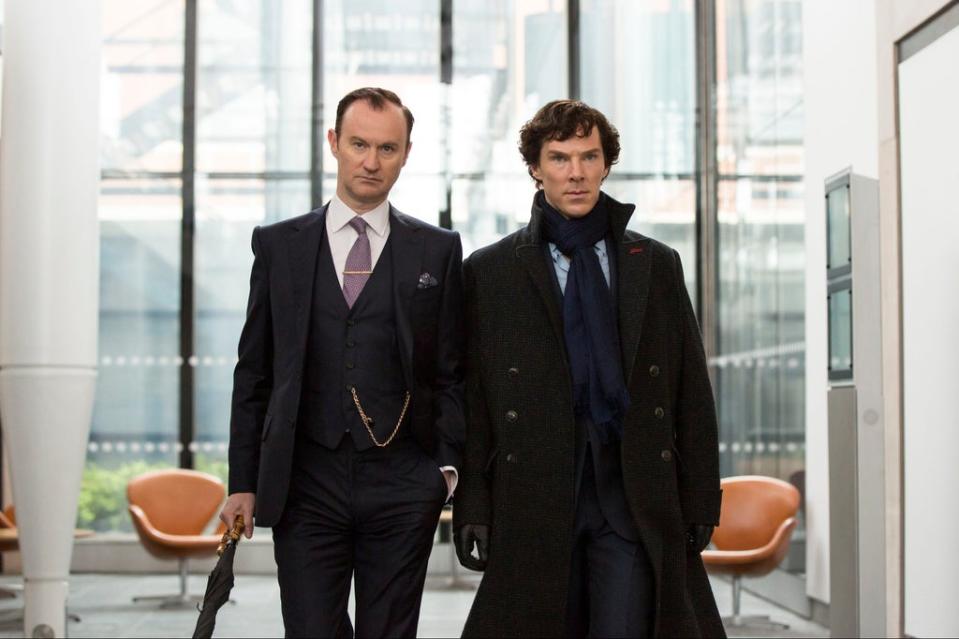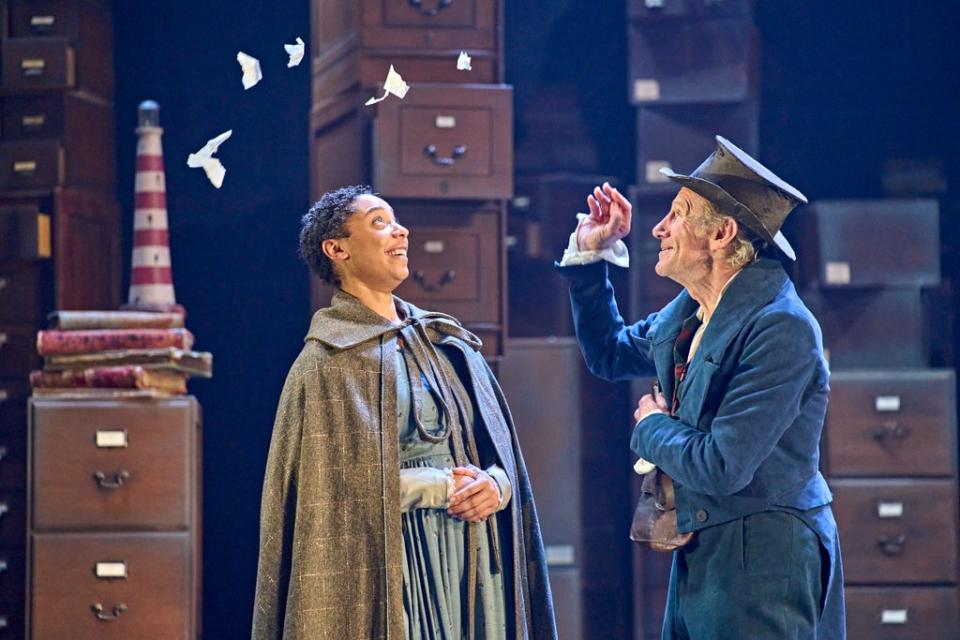Mark Gatiss on his new version of A Christmas Carol coming to London’s Alexandra Palace

It must be hard to buy presents for Mark Gatiss, as he’s already got “basically all I ever wanted”. When he and fellow Bretton Hall drama students Steve Pemberton and Reece Shearsmith set up their edgy comedy troupe The League of Gentlemen with Jeremy Dyson in the early 90s, it was with the intention “to get known for something that would then open doors to other things”.
Twenty years of the League indeed led the 55-year-old to a stunningly prolific and diverse career as an actor, writer and latterly a director, including close involvements with the TV reboots of his favourite childhood stories: Doctor Who, Sherlock, Dracula. This Christmas, he again gets to indulge his passions – in particular, the spooky ones - with a trio of new projects.
He’s adapted and plays Jacob Marley in a new production of Dickens’s A Christmas Carol that comes to the rediscovered Victorian theatre at Alexandra Palace this month. He’s written, directed and plays the villain in Sky’s adaptation of the beloved 1972 film The Amazing Mr Blunden. And the latest of his 30-minute TV versions of MR James’s ghost stories, The Mezzotint, starring Rory Kinnear, will screen on BBC2.
Supernatural stories suit the festive season as it’s “the turn of the year, looking backwards as well as forwards, and a melancholy time for a lot of people, full of memories of those who have gone”. And it was Dickens who “crystallised” the connection between Christmas and ghosts.

Gatiss first saw Ronald Neame’s 1970 film of the Scrooge story when he was four and has loved every iteration since, including Jack Thorne’s now-perennial Old Vic staging. “In every interview I’ve ever done I’ve been asked about dream parts and always said ‘Jacob Marley’ in the hope someone would offer it me,” he says. “Eventually I had to do my own version.”
His adaptation is “properly spooky but also great fun and joyous” and brings out Dickens’s fury about social injustice. “The story is so familiar it can often feel saccharine, like a Quality Street tin, but the beating heart of it is very angry,” he says. “We were rehearsing in Spitalfields and we’d come out on Thursday evening and there was a huge food bank queue round the block. The reason it keeps chiming with people is that it’s forever relevant.”
The Amazing Mr Blunden is a more cheerful affair, the story of a mysterious old man who introduces a young brother and sister to child spectres from the past in order to prevent a crime. Lionel Jeffries directed and starred in the original film. “I saw it at school when I was eight, just before we broke up for Christmas,” Gatiss recalls. “It’s very bittersweet, moving, funny and charming. Originally the idea of remaking it felt like heresy. I read the book [Antonia Barber’s 1969 source novel The Ghosts] again and, unlike the film, the family are from the modern day. I thought that was worth exploring.”

This time Simon Callow plays the title role, but Gatiss has brought back three actors from the 1972 version, including the delightful Madeline Smith, and himself plays the villainous Mr Wickens under several layers of prosthetics. “That’s what it’s all about, isn’t it - dressing up?” he grins. “In A Christmas Carol I play a few other parts, and I’ve made sure I get the ones where I can put some teeth in and have a bit of fun. It’s what I always responded to, growing up. The actors I loved growing up, like Alistair Sim, Ronnie Barker or Leonard Rossiter, were always recognisable under the wigs and glue and teeth.”
He tells me with delight that on another recent project, the outer Hebridean inter-war film The Road Dance, his costume included a toupee formerly owned by another hero, Scottish comedy actor Stanley Baxter. “They gave it to me at the end of the shoot, and it’s like the Holy Grail to me,” he says. “It’s my go-to toupee now. It’s always useful to be able to say: ‘I have my own…’.”
He can’t tell me if he wears it in the forthcoming Mission Impossible 7: the cast are sworn to secrecy. “It’s kind of fun but also overwhelming, the only thing that’s as big as Bond, and Tom Cruise is there all the time. He was just so kind and lovely and helpful and fun. But every now and then you look at him out of the corner of your eye and go “F*CKIN’ ‘ELL IT’S TOM CRUISE!” He’s been part of our cinemagoing life since we were teenagers and he looks exactly the same. It’s like someone’s walked off a poster.”
Shooting the Road Dance, and MI7, he managed to avoid the second lockdown. Under the first, there was no acting work for him or his husband, Ian Hallard, and he found it impossible to write. “I texted Steven Moffat [his collaborator on Doctor Who, Sherlock and Dracula] and said, ‘who would have thought a global pandemic wasn’t conducive to the muse?’,” he says. “I paint as a hobby and that saved my mental health, really.

“But when we get to a place where we can look back on this period, it will lead to a lot of interesting work, not directly about [the pandemic], but about the isolation and detachment, living through the apocalypse we’ve all had dry runs for through drama. Except there weren’t Triffids on the streets, there were anti-vaxxers.”
Gatiss is a thoughtful interviewee, diplomatic unless sure of his opinion or challenged on his work. The League have always denied that the black clown makeup of the character Papa Lazarou was in any way racist, but I wonder if the savage caricatures and cross dressing in the show now feels dated or embarrassing. “No, I’m immensely proud of it,” he says. “We weren’t making Keeping Up Appearances, not to be pejorative about that. It was always very edgy comedy, and sometimes very bleak and genuinely strange.”
He’s less strident about his fellow Doctor Who alumnus Russell T Davies’s recent suggestion that gay actors should play gay parts: “It’s a complex issue. You want to massively increase the opportunities for gay actors, for people of colour, for women. But you don’t want to get so reductive that the only person who can play Hamlet is an actual Prince of Denmark.” As a gay man himself he’s worried about the erosion of liberalism in politics and public discourse – “I’m a cockeyed optimist, but I don’t feel very optimistic at the moment.” And as someone from a modest background, he fears people like him are now priced out of the arts and education.
“The idea of Alan Bennett, another of my heroes, getting a scholarship to Oxford would be so much harder now,” he says. “Class is a huge barrier: it got so much better and now it’s so much worse again. It’s not just about the downgrading of arts in education, the destruction of drama clubs: it’s about making sure [working class] people can see you can do it. It still happens to me: someone I know quite well asked recently what college I went to. There’s a sort of assumption that if you’ve done okay you must have gone to Oxford or Cambridge. It’s like the early 80s again in lots of ways.”

Gatiss and his older brother grew up in Sedgefield, County Durham, their father a mining engineer who later went to work “at a perfectly ordinary postwar mental hospital which has become in the public imagination something like Arkham Asylum”. He used to downplay the institution’s significance to his life, but now acknowledges that “it was quite a strange upbringing, living opposite this place: we went swimming there, went to the cinema there, had our hair cut there. It probably was a big influence on my worldview, my familiarity with mental health and also a kind of northern Gothic.”
Although it was hard to come out, first to his mum, then his dad, his was a childhood of “love and stability and fun. I lost my dad in May and that brings an awful lot of stuff to the surface, but it’s all good stuff; interesting, funny things.” For instance, he assumed his parents were terribly liberal in allowing him to watch Hammer and Amicus horrors at an early age: now he realises it was just that his dad wanted to watch them.
He and Hallard met online and married in 2008, in Middle Temple, under the portrait of Oscar Wilde’s nemesis, Edward Carson QC. They live in two knocked-together Georgian cottages in North London, about which myths abound. No, he says, he no longer has four rooms full of DVDs. And no, he doesn’t have a Victorian laboratory either.
“I did build one in our old house 15 years ago, but it was a life lesson: I built the thing I wanted most when I was eight, but having done it as a grown man, I realised it was a folly and dismantled it. I still have some bits and bobs. But the thing I want which I’ve never had is a Wimshurst Machine – those two celluloid discs that rub together and make that Frankenstein crackle of electricity.” Well, that’s the gift problem sorted, then.
A Christmas Carol – a Ghost Story is at Alexandra Palace from November 26 to January 9, christmascarolonstage.com. The Amazing Mr Blunden premieres at the BFI with a Q&A with Gatiss and stars Tamsin Greig and Simon Callow on November 29, bfi.org.uk, and will be on Sky and NOW in December. The Mezzotint will air on BBC Two and iPlayer in December
Read More
A Christmas Carol review: you’d need a heart of stone not to be moved
Four Quartets review: a dense evening, but Fiennes casts a spell
Manor review: a Twitter thread set in a National Trust property

 Yahoo News
Yahoo News 
